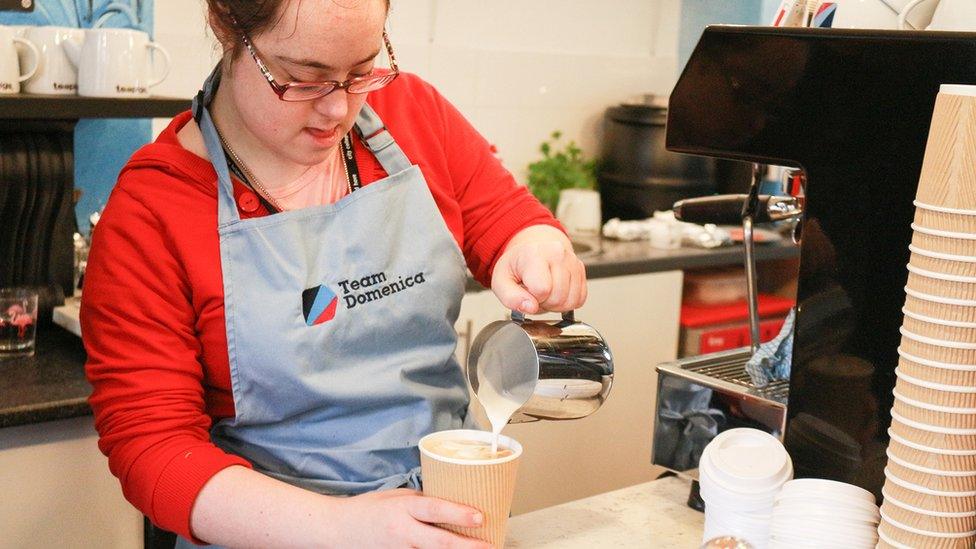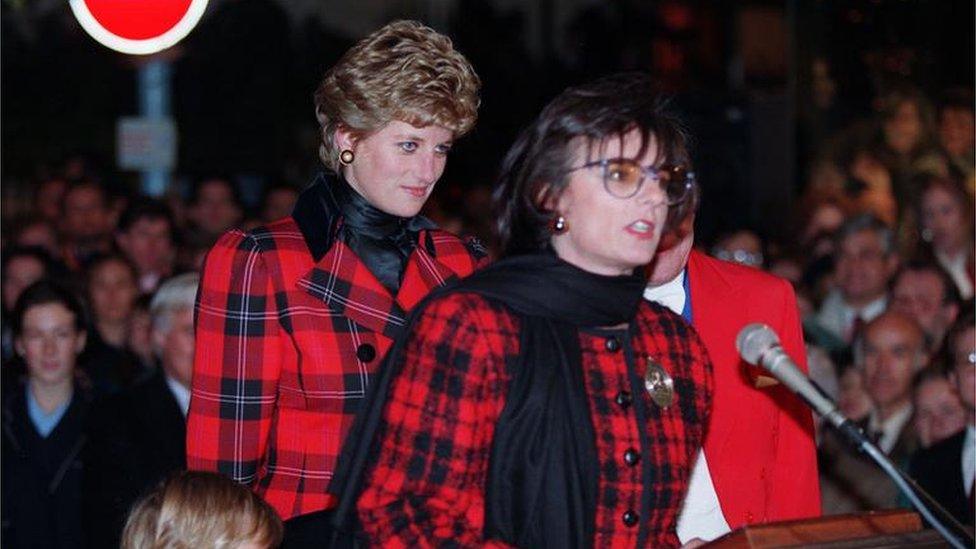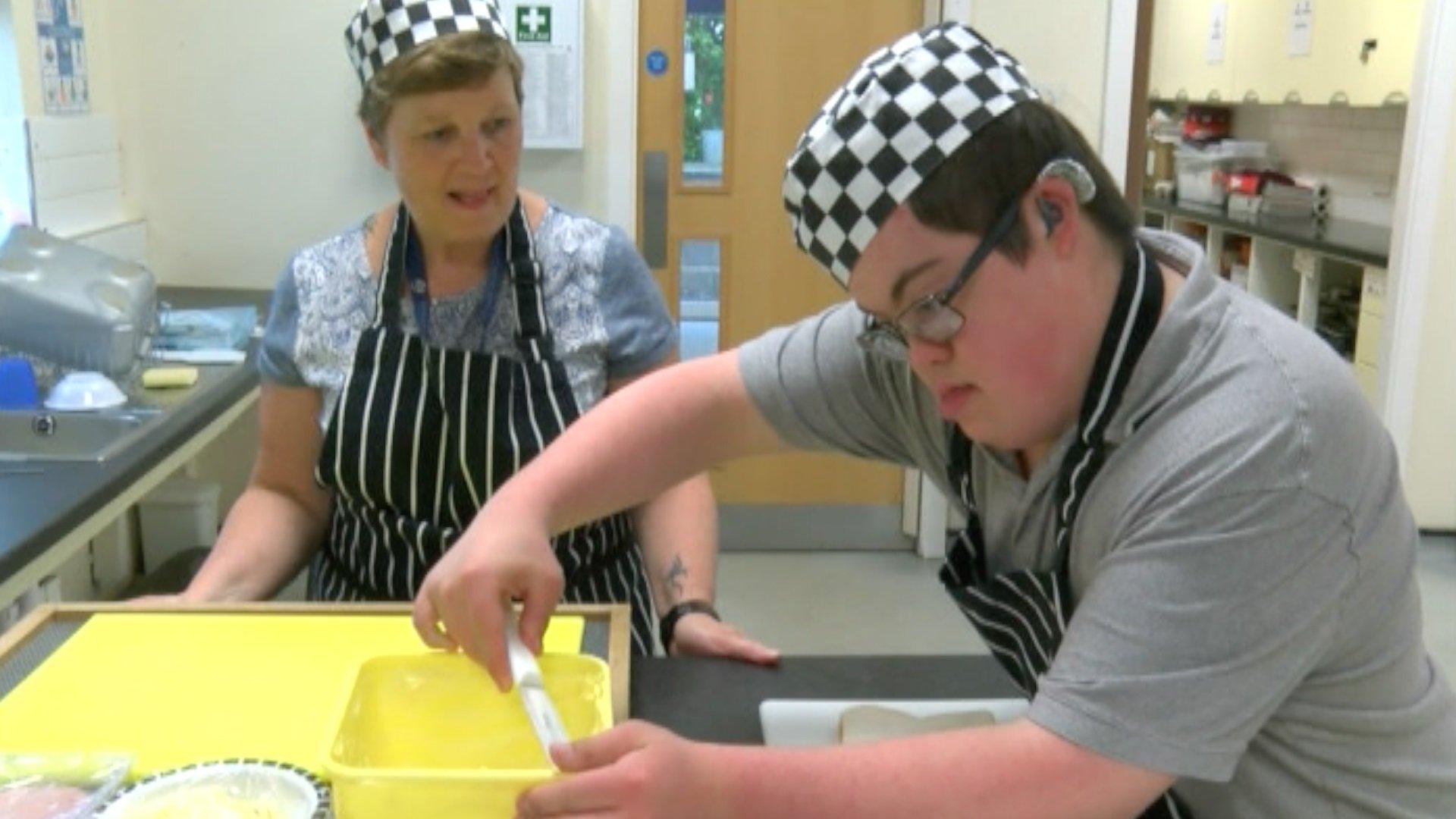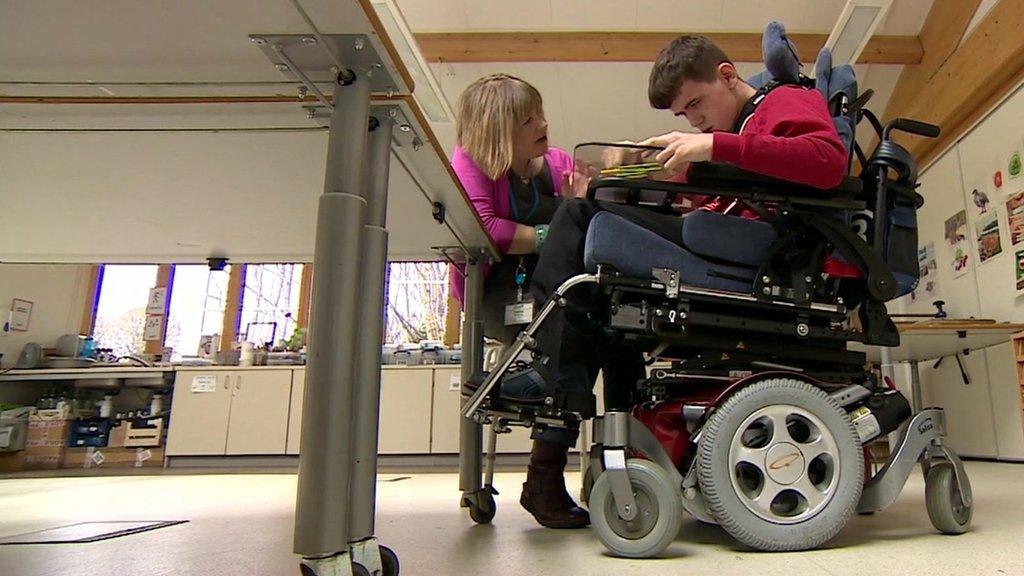Rosa Monckton: Let learning disabled work below minimum wage
- Published

Rosa Monckton wants a "fulfilling and purposeful life" for her daughter, Domenica Lawson
People with learning disabilities should be allowed to work for below the minimum wage, says Rosa Monckton, who was a close friend of Princess Diana.
Miss Monckton, whose youngest daughter has Down's Syndrome, said that unless the law changed, they would be denied the human dignity that comes with work.
Writing in the Spectator,, external she said she wanted to see a "therapeutic exemption" for disabled workers.
Charity Mencap said it was important for business to create the right roles.
About 1.4 million people in the UK have a learning disability, of whom just 6% are in paid work, Health and Social Care Information Centre data from 2015 shows.
'In the shadows'
Miss Monckton wrote: "Services are closing, and day centres barely exist any more, so what lies ahead for people like my daughter?
"Unless the law changes, they can expect a life spent in the shadows, slumped on a sofa, eating the wrong sort of food, watching daytime television.
"This is not about the right to a minimum wage, it is about the right to have the human dignity that comes with work, and with being included."
From April, the minimum wage goes up to £7.05 an hour for 21 to 24-year-olds, and £7.50 an hour for workers over 24.
Miss Monckton said the ratcheting up of this was the single thing that made it most difficult to get people with learning difficulties into work, but raising the subject was considered "brutish and inhumane".
"It should be based... on the feeling that you've got somewhere to go to when you get out of bed in the morning"
Speaking to the BBC, Miss Monckton said: "I'm not saying they can't be paid the minimum wage. I'm saying there shouldn't be a legal obligation to do so.
"The rules are there to prevent people from being exploited but... there should be separate rules for people with learning disabilities... based on self-worth, on the feeling that you have got somewhere to go to when you get out of bed in the morning."
She added: "It has become an extremely controversial subject. It absolutely shouldn't be. It should be a given that people with learning difficulties have an equal chance to get into employment and the thing that is preventing them... is the minimum wage."
In 2011, Conservative MP Philip Davies told Parliament during a debate on the Employment Opportunities Bill that disabled people should be able to offer to work for less than the minimum wage to get on the jobs ladder.
His remarks were condemned as "outrageous and unacceptable" by a select committee chairwoman and "a preposterous suggestion" by a charity.
'Purposeful life'
But in her Spectator article Miss Monckton said that it was "so obvious" to most parents in her position that a "therapeutic exemption" from the minimum wage would have a "transformative effect".
"In practice, money isn't the real point.
"People with a learning disability may still be living with their parents.
"Very often they have no understanding of money," she added.
"They want to work so as to have a fulfilling and purposeful life."
She described how her daughter, whose godmother was Princess Diana, once asked if she could now go to New York after being given a £5 tip.

Rosa Monckton was said to be a confidante of Princess Diana,, photographed here with her n 1993
Mencap, a charity for people with a learning disability, disagreed that the main barrier to getting work was the minimum wage.
Educating and working with employers to create the right roles was the most important factor, said Dan Scorer, head of policy.
"With the right training and support, people with a learning disability can be valued employees whose work is of the same value as anyone else."
He added that current employment support was "completely inadequate" and the government has a lot to do if it is to improve the "appallingly low levels of employment" of people with a learning disability.
The trade union, Unison, said people with learning disabilities benefited from good quality jobs like anyone else, and insisted no-one should get less than the minimum wage.
"Employers must be encouraged to take them on, but not on Scrooge wages," the union's equalities officer, Lucille Thirlby, said.
Miss Monckton set up a charity last year after she found there was nothing for her child to do after leaving college.
Team Domenica, named after her daughter, runs a course in supported employment as well as a cafe open to the public and an on-site business, both of which are staffed by people with learning difficulties.
Update 15 March 2017: This report has been amended to make clear that Philip Davies said people with disabilities should have the option of working for less than the minimum wage.
- Published15 February 2017

- Published26 September 2016

- Published8 June 2016

- Published9 April 2016
